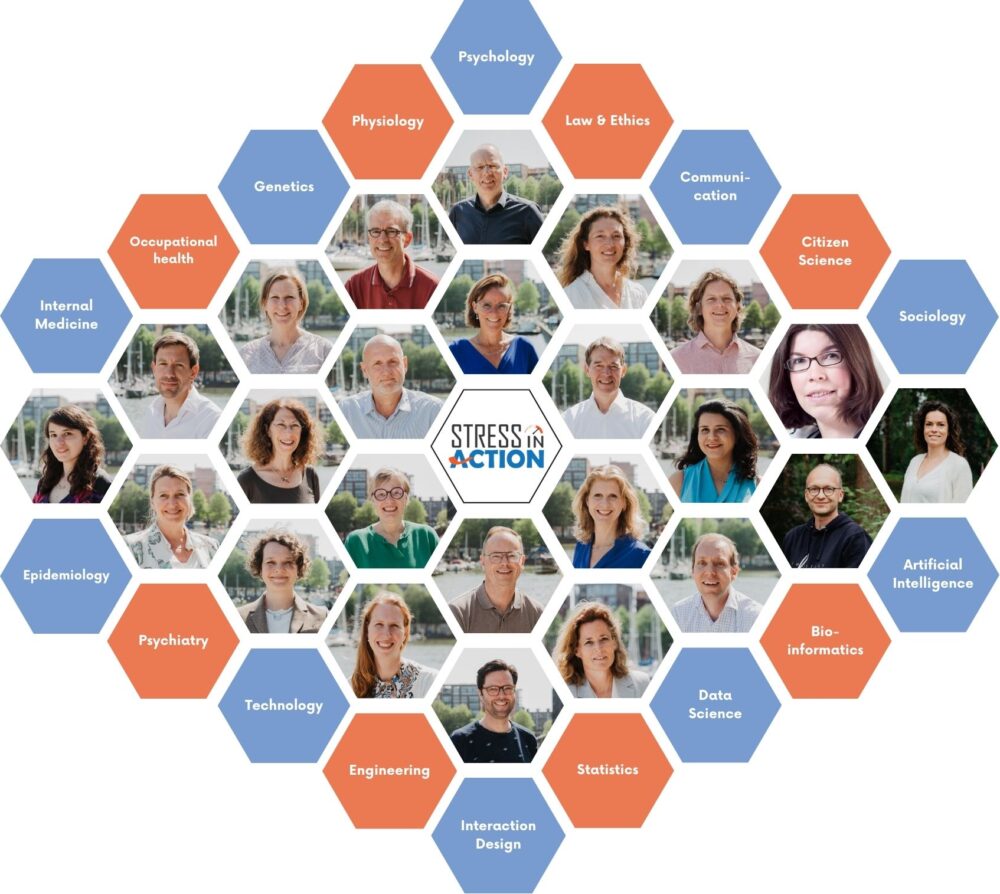Eco de Geus
Coordinating researcher/PI

Title(s)
Professor of Biological Psychology
First name
Eco
Initials
J.C.N.
Last Name
de Geus
FTE
0.4 fte/year for 10 years
Institute
Vrije Universiteit Amsterdam
De Geus (1960, PhD) is head of the department of biological psychology, that employs 5 full professors and 50 staff members involved in teaching and research in the areas of biological psychology and behaviour genetics. The department maintains the Netherlands Twin Register, NTR (www.tweelingenregister.org/en/research). The NTR constitutes a large research infrastructure (>150,000 participants) including longitudinal surveys, experimental data and biomaterials obtained in the past 30 years in around 25% of all twins and multiples in the Netherlands and their family members.
Since his cum laude PhD, the focus of de Geus’ research is the psychophysiological study of individual differences in behaviour and health. A major line of research is the interplay between genes, stress, and lifestyle, and how these impact on cardiovascular, cognitive and mental health. This is done from a genetic perspective using both longitudinal twin-family designs and molecular genetic approaches, including candidate gene studies and whole-genome association using SNPs, gene expression and methylation patterns. Mental and cognitive health is studied by survey measures and clinical interviews, but also through psychophysiological laboratory studies including neurocognitive testing, EEG and MRI studies. Cardiovascular health and relevant stress responses are studied in the laboratory, the latter through standardized conditions including classical lab-based stress-reactivity testing, and in “real life” by using ambulatory measurements of blood pressure, cortisol, and the autonomic nervous system with the VU University Ambulatory Monitoring System (VU-AMS, www.vu-ams.nl). This is a system he developed for 24-hour recordings of peripheral physiology. It is currently used world-wide by over 45 research groups to study stress and emotion in naturalistic settings, and income creates a revolving ‘AMS talent fund’ for continued innovative research on ambulatory recording. In this research area de Geus successfully supervised 29 PhD theses and has 4 PhD projects still ongoing.
In terms of research leadership, de Geus was vice-dean and director of research of the Faculty of Psychology and Education (>500 research staff) at the Vrije Universiteit, Amsterdam from 2009-2012, responsible for all matters related to research, as well as its human resources, facilities and budget. From 2012-2017, he directed the Institute for Health and Care research (EMGO+), a multidisciplinary research institute on prevention and health care that united over 700 scientists in e.g. the field of behavioural and health sciences, epidemiology, primary care, youth health care, internal medicine, psychiatry, and elderly medicine. Under leadership of de Geus, the EMGO+ institute received the highest rankings in all three categories (Quality, Relevance and Viability) from the international review board in 2016. Over the last years, de Geus helped the EMGO+ institute evolve into the Amsterdam Public Health (APH) institute (see www.amsterdamresearch.org). He currently chairs the Executive Board VUmc Research BV (Ltd) that takes responsibility for all research contracts of the VUmc with private partners (the BV’s current portfolio value is ~50 Million €).
- De Geus has first- and senior-authored highly cited publications on autonomic nervous system functioning in Nature Communications, Psychophysiology, Psychosomatic Medicine, Psychoneuroendocrinology, Medicine and Science in Sports and Exercise, Obesity, and Biological Psychiatry.
- He serves as Associate Editor for Psychosomatic Medicine and sits on three Editorial Boards. He hosted five scientific conferences (150-450 attendants), frequently gives invited lectures in (inter)national symposia and conferences (>3 annually), and has organized/chaired 35 symposia at international conferences.
- He is part of multiple large expertise-networks that operate worldwide to harvest the investments in longitudinal epidemiological data collection paired to DNA/RNA biobank resources in large genome-wide association meta-analyses. Networks of collaboration include include GIANT (Genomewide Investigation of ANThropometric measures); ENGAGE (European Network for Genetic and Genomic Epidemiology; CHARGE (The Cohorts for Heart and Aging Research in Genomic Epidemiology); CORtisolNETwork (CORNET) Consortium, CARTA (Consortium for Causal Analysis Research in Tobacco and Alcohol); EAGLE (EArly Genetics and Lifecourse Epidemiology), EGG (Early Growth Genetics); TAG (Tobacco and Genetics Consortium); ENIGMA (Enhancing NeuroImaging Genetics through Meta-Analysis); PGC & PCG2 (Psychiatric GWAS Consortium), IHGC (International Headache Genetics Consortium); SSGAC (Social Science Genetic Association Consortium), FibrinoGEN consortium, ReproGen consortium; ICBP (International Consortium on Blood Pressure), MiBioGen (Microbiome Genetics) Consortium, and the Covid-19 Host Genetics initiative. Together with Snieder, another member of the SiA team, de Geus co-leads the international VgHRV consortium on heart rate variability that has members in 34 research institutes from 11 countries.
- He is the central hub in a large network of international collaborators that use the VU-AMS ambulatory monitoring system to record stress physiology (www.vu-ams.nl/contact/vu-ams-worldwide/). His main role is to advise on optimal instrumentation, methodology and interpretation of ambulatory recording in general and with the VU-AMS in particular.
- A substantial earning capacity is needed to sustain the large and unique NTR infrastructure, that heavily relies on grants obtained by the members of de Geus’ department. He himself has received over 11 M€ of grant support as a PI or Co-PI over the past 10 years alone.
- He chaired two Committees of the Dutch Health Council for the 2017/2021 editions of the National Guidelines for Physical Activity, providing evidence-based guidelines for minimal and optimal patterns of regular physical activity (including minimizing sedentary behaviour) to be used in national public health policies. He also chaired the Executive Committee for the Dutch Ministry of Justice and Safety that reported in 2018 in the (future) applicability of quantified self (QS) methods for stress recordings within the context of the justice department.
- De Geus is acting treasurer of the Executive Committee of the Society for Ambulatory Assessment that advocates the development and dispersion of evidence-based ambulatory assessment of behavioural physiological and physical activity states in real-life settings and just-in-time interventions based on these assessments.
- de Geus EJC, Gianaros PJ, Brindle RC, Jennings JR, Berntson GG (2019). Should heart rate variability be “corrected” for heart rate? Biological, quantitative, and interpretive considerations. Psychophysiology 2019; 56(2):e13287.
- Nolte IM, …., de Geus EJ. Genetic loci associated with heart rate variability and their effects on cardiac disease risk. Nature Communications 2017;8:15805.
- Hu MX, Lamers F, Hiles SA, Penninx BW, de Geus EJ. Basal autonomic activity, stress reactivity, and increases in metabolic syndrome components over time. Psychoneuroendocrinology 2016;71:119-26.
- Neijts M, van Lien R, Kupper N, Boomsma D, Willemsen G, de Geus EJ. Heritability and Temporal Stability of Ambulatory Autonomic Stress Reactivity in Unstructured 24-Hour Recordings. Psychosomatic Medicine 2015; 77:870-81.
- van Lien R, Neijts M, Willemsen G, de Geus EJ. Ambulatory measurement of the ECG T-wave amplitude. Psychophysiology 2015;52(2): 225-37.

